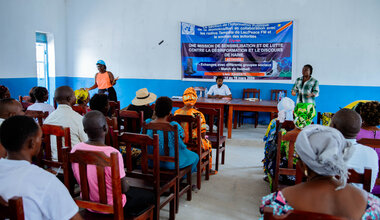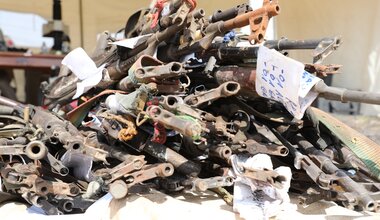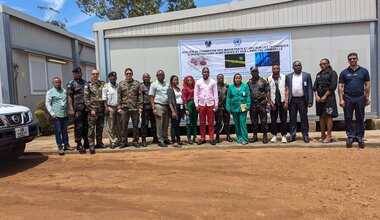World Science Day for Peace and Development:
Martin Kobler, Head of MONUSCO and Abdourahamane Diallo, UNESCO Representative to the DRC urge Congolese youth to embrace sciences
Kinshasa, 8 November 2014 – The international community commemorates this Monday, 10 November, the World Science Day for Peace and Development. Martin Kobler, Head of MONUSCO and Abdourahamane Diallo, UNESCO Representative to the DRC take this opportunity to urge Congolese youth, both male and female to embark on scientific careers as a way of contributing to economic development and the consolidation of peace in their country.
“We all dream of a Congo where millions of young people can draw inspiration from great scientists in the country and across the African continent.
Just like the
famous gynaecologist, Doctor Denis Mukwege, Director of Hôpital Panzi in Bukavu who won
the Sakharov Prize on 21 October
for his actions in favour of victims of rape and sexual violence, I
encourage you to further invest in the study of sciences,” said Mr Martin
Kobler, Head of MONUSCO.
“The Girls
and young women of this country are full of talent, imagination and potential.
Let’s encourage and ensure equal participation of women and men in the field of
science. I call upon the Government to further improve the teaching of science
given its meaningful contribution to the emergence of a new Congo,” said
Abdourahamane Diallo, UNESCO Representative to the DRC.
Note to editors:
Launched by
UNESCO in 2001, the World Science Day for Peace and Development is commemorated
every 10 November throughout the world. It is the opportunity to recall
UNESCO’s mandate and commitment for science. This year’s theme is
“ Quality Science Education - ensuring a sustainable future for all”.
Since its
inception, the World Science Day for Peace and Development has generated
concrete projects and created linkages between science and the society. Each
year, as part of the celebrations, partners like UNESCO national commissions,
inter-governmental and non-governmental organizations, scientific research
institutions, professional associations, the media, schools and science
teachers commit to Peace and Development. At government level, several
ministries have announced a fresh commitment to raise spending on science;
others have used the Day to launch a new science policy programme involving
scientific institutions, civil society organizations, universities and schools.
The World
Science Day for Peace and Development has also generated projects aimed at
promoting scientific cooperation between scientists living in areas affected by
conflict.
 ONU
ONU Nations Unies Maintien de la paix
Nations Unies Maintien de la paix




